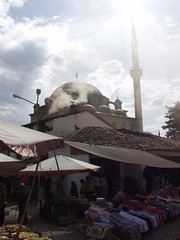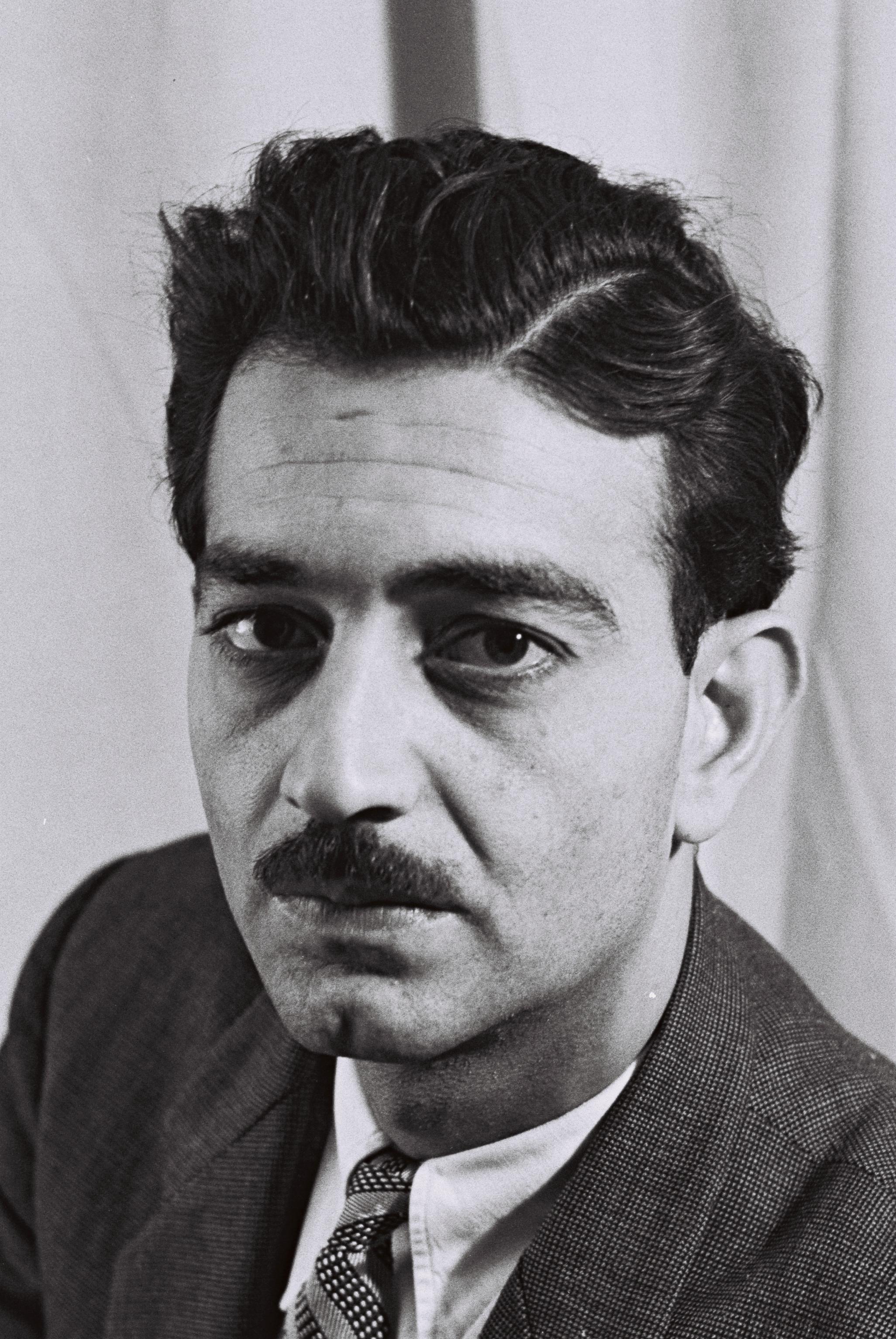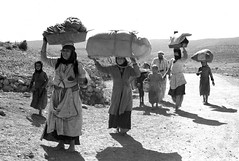| Middle East (Photo credit: rogiro) |
| Syria (Photo credit: ewixx) |
The uprisings in the various Arab countries spreading across Tunisia, Egypt and Libya to the Middle East seemed to be a long awaited dream fulfilled. The intellectual, secular people, many of them young academics, wanted a radical change to the autocratic, megalomanic regimes ruling their respective countries for many generations. Dictators of the likes of Husni Mubarac of Egypt, Muammar Ghaddafi of Libya were overthrown in bloody uprisings.
It all started with Mohamed Bouazizi of Sidi Bouzid in Tunisia setting himself alight and burning himself to death on 17th December 2010 during increasingly violent demonstrations. This eventually led to the downfall of President Zine El Abidine Ben Ali on 14th January 2011.
The demonstrations spread like wild fire across many Arab countries in North Africa and the Middle East. The reasons for the uprising were the same in all these countries. High unemployment rate, hunger, corruption, no freedom of speech, basic human rights and political freedoms were non-existent. The people were also living in severe poverty.
Many of us felt that these uprisings were a positive development. At last the Arab people would achieve human rights and democracy. They will become an integral part of the free world. The idea of basic human rights, which we in the free world take for granted, is non-existent in the Arab countries, not to mention the intense suffering of the people under evil dictators, who became wealthy on the backs of their own people.
Many people, even in Israel, were supportive of the uprisings in the hope that at last pragmatism in the Arab world would move the Middle East towards peace between Israel and her Arab neighbours. There was also hope that the uprisings would have a positive effect on change in government in Palestine, where corruption is rife and lack of transparency is also taking its toll on the Palestinian people. Maybe, as many of us thought - perhaps naively, that Hamas would go and democracy would replace the megalomaniac leadership in Gaza. Naturally, many of us hoped to see peace negotiations with a representative Palestinian leadership that would also end the Israeli Occupation and a democratic Palestinian state alongside Israel would be closer to becoming a reality.
Now more than three years later we see that the Arab Spring did bring changes and new leadership in so-called democratic elections with the exception of Syria and Lebanon who are embroiled in factional fighting. In Syria, tens of thousands of innocent civilians are being massacred on a daily basis. The Assad regime is hanging on by a fine thread and President Bashar al Assad's forces are having a free day murdering opponents of his regime without mercy. Assad is being supported by the evil Iranian regime of Mahmoud Ahmadinejad and his evil proxy, Hezbollah, a terrorist Shiite movement under Sheik Hassan Nasrallah's leadership that is responsible for the unrest in Lebanon as well as the firing of rockets into Israel from the north.
The problem in Syria is very complex as there is factional fighting among the rebels themselves. A power vacuum is being created on the ground, which is being filled rapidly by Islamist fanatic groups such as Al Qaeda, Salafis and various extremist Islamist groups, including Al-Qaeda. Rebel fighter cruelty, as well as the cruelty of the Assad regime with the latter's use of chemical weapons to remain in power at all costs, is moving Syria into a bloody free for all killing fields of Islamist terror groups. The future in Syria is grim and unpredictable, so much so that the EU is not prepared to send arms to bolster an alternative regime to Bashar al Assad for fear that the weaponry will fall into Islamist terrorist hands.
Our hearts go out to the suffering Syrian People - innocent men, women and children, who have nowhere to go. We should open our borders to allow entry to these refugees to save them from certain death. Even Turkey and Jordan have given these people shelter. We Jews had our Holocaust under Nazi Germany and we were refugees seeking shelter in western countries, many of whom never allowed us entry or granted us asylum. This should be engraved in our collective memory when dealing with fellow human beings who are in severe distress as in Syria. We must not pass the buck and say that it is the neighbouring Arab countries' "responsibility".
It is sad that all the uprisings in the Middle East did not bring positive regime change for which we hoped. Why does democracy always allude the new so-called post-uprising governments? Is it because many people in these countries do not know the meaning of democracy or have been brainwashed by Islamic parties, who promised the people that a return to Islam would secure their self-esteem, freedom and dignity, which was eroded by the various autocratic regimes?
Tunisia has an Islamist regime - Enahda Party rule - which has not initiated changes towards democracy and economic improvement for its people. There are gross dissatisfaction and disillusionment in Tunisia. Where are the secular academics, who were at the forefront of the uprisings? It does not look as if the Tunisian people will benefit from the changes. On the ground, there has been no movement to alleviate the economic situation there nor shift towards a western-style democracy. Enahda is an Islamist Party that places great emphasis on Sharia law. The same can be said of Egypt's Moslem Brotherhood which was also at the forefront of the uprising.
Dr Mohammed Morsi, an American University graduate, of the Muslim Brotherhood was elected President of Egypt midst great ground root support of optimism. He exhibited pragmatism in his speeches and initially won the hearts of his people as he swept into victory with his demagoguery-type speeches. Once in power, he did not show any signs of delivering the goods that his people expected. Dissatisfaction increased and the anti-democratic side of Morsi's leadership style became clear. Mass demonstrations occurred once again in Tahrir Square in Cairo, followed by anti-Morsi demonstrations in other city squares in Egypt. Basic human rights and liberalisation did not occur. The people are dissatisfied with Morsi. Women's rights are trampled on and they are also abused in Egypt. Signs that Egypt will become a democratic country respecting human rights and having a sound economy is still very far away. There will be no fair distribution of wealth so that Egypt's people can benefit.
The trends after the various uprisings seem to be clear even at this stage. Power will be in the hands of Islamist regimes that will remain conservative and insensitive to democratic change. It is as if those who had initiated regime change to a new positive order were thwarted by a severe backlash of Islamic conservatism and intolerance that is resistant to meaningful change. It seems that the downfall of conservative, cruel despots have been replaced by Islamic despots who are not going to move towards progressive and democratic leadership.
The situation in the territories whether under Hamas in Gaza or the Palestinian Authority in the occupied West Bank were hardly affected and for them, it is business as usual. Hamas in Gaza is anti-democratic, racist and will tolerate no opposition to their regime. They are cruel and heartless as well as being an offshoot of the Moslem Brotherhood of Egypt. The future in Gaza remains grim for the Palestinians living there. Those who oppose the Hamas leadership face severe punishment and even death by being towed by donkey cart in the streets. Hamas survives on terror and dissatisfaction of its citizens, blaming Israel for Palestinian suffering. Hamas has no plan for rehabilitating its people. It is doubtful if the Arab Spring would have any positive effect in the Palestinian autonomous areas as there has been no progressive new order replacing the autocratic despotic regimes prior to the uprisings in the various Arab countries, where regime change did not mean any change for the better.
Much has been ventured in the Arab Spring but nothing has been gained. The Arab Spring may be referred to as an Arab Nightmare. This is true of what is happening in Syria.













